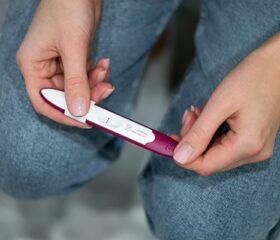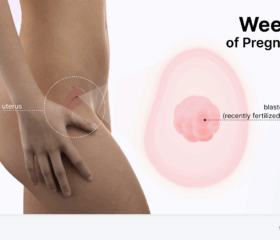Pregnancy Constipation: Causes and How to Find Relief
Pregnancy comes with its fair share of uncomfortable surprises. Among the most common—yet least talked about—is constipation.

- How do you know if you’re constipated while you’re pregnant?
- Why does constipation happen during pregnancy?
- How can you treat and prevent constipation during pregnancy?
- What remedies for constipation should you avoid during pregnancy?
- When should you talk to your doctor about your pregnancy constipation?
- Can you still have constipation after giving birth?
- Final thoughts
Over 40% of moms-to-be deal with this uncomfortable pregnancy symptom. 1 The good news is that it’s usually manageable with simple lifestyle adjustments and safe at-home remedies.
Keep reading to learn how to find relief and what you can do to prevent it from happening in the first place.
How do you know if you’re constipated while you’re pregnant?
You’re constipated if you have fewer than three bowel movements per week. 2 Constipation can also mean having problems with your bowel movements in general—whether that’s straining when you poop or feeling like there’s always a bit left over in your bowels that won’t come out.
You might also feel bloated and have stomach pains. If you do manage to poop, you may find that your stools are hard or lumpy.
When does constipation usually start during pregnancy?
You can get constipation as early as the first trimester, especially around the second or third month when your body’s going through a lot of hormonal changes. However, you can get it at any point during your pregnancy. 1
Why does constipation happen during pregnancy?
One of the primary culprits for those backend backups is your hormonal changes—particularly a rise in progesterone. This hormone relaxes your muscles, including those in your digestive tract. As a result, the movement of food through your intestines slows down. 2
Other notable causes of constipation include: 3
- Dehydration: Your body works overtime when you’re pregnant as your blood flow and fluid retention increase. This can lead to dehydration, which then causes hard stools and constipation. It is easier to become dehydrated during pregnancy than outside of pregnancy.
- Growing uterus: As your baby grows, your uterus expands, putting increasing pressure on your intestines and making it more difficult for waste to pass through.
- Lifestyle changes: Diet changes, dehydration, and reduced physical activity can cause constipation. Stress and anxiety can also contribute.
- Medications: You may experience constipation if you take medication for nausea and vomiting (i.e., morning sickness), antacids for heartburn, strong painkillers, multivitamins, and calcium tablets. 1
Moreover, if you were struggling with constipation before you got pregnant, your symptoms may only get worse during this period. 1
Prenatal vitamins can also cause constipation
While the importance of prenatal vitamins during pregnancy can’t be overstated, they can cause constipation. Iron, a key component of most prenatal vitamins, can cause changes to the consistency and color of your stool, as well as bloating, gas, upset stomach, and cramps. 4 Rather than stopping taking them, talk to your doctor about your prenatal vitamins’ side effects and about changing the frequency of your prenatals or finding an alternative.
How can you treat and prevent constipation during pregnancy?
If you want to get some relief—and who wouldn’t?—you can use three strategies to treat constipation:
Change your eating habits
Sometimes, when you’re a little backed up, the solution comes down to changing what (and how) you eat. Try eating smaller, more frequent meals to ease the burden on your digestive system and reduce bloating. Opt for six mini-meals a day rather than three large ones. Remember to eat slowly, too. 5
Try increasing your fiber intake
During pregnancy, you need about 25 grams of fiber per day. 6 Make sure you’re eating fibrous foods and aim for five daily servings of fruits and vegetables, especially those with edible skins. 7 8 9
Good foods to add to your pregnancy diet include: 10 11 3
- Fresh fruits (apples, raspberries, etc.)
- Vegetables (spinach, zucchini, broccoli)
- Whole grain bread, cereal, rice, and pasta
- Brown rice
- Nuts like almonds and peanuts
- Legumes (red kidney beans, baked beans, lentils, split peas)
That said, don’t add too much fiber all at once since this can cause gas, bloating, diarrhea, and abdominal cramps. Instead, gradually increase your fiber intake, as this will give the naturally occurring bacteria in your digestive system time to adjust. 8
Get more fluids
Drink 8–12 cups (64–96 ounces) of water daily. 12 Staying well-hydrated softens your stools and makes it easier for food and fiber to move through your digestive system. 8 13
You can also include other fluids like:
- Hot tea
- Soups
- Broth
Carry a water bottle with you and sip from it throughout the day to keep track of how much water you’re drinking. You can also record your hydration and diet in a pregnancy tracker app.
Make lifestyle changes
Getting regular exercise can relieve constipation. Some of the best pregnancy workouts include walking, swimming, stationary cycling, and strength training. There are many benefits of prenatal yoga, too. 1 The general recommendation during pregnancy is to exercise for 150 minutes a week, meaning working out in 30-minute sessions at least five days a week.
Of course, even if that’s unrealistic for you, sneaking in a little exercise is better than none at all, so just try your best. 14
Note that you should avoid activities or exercises that put you flat on your back after the first trimester. This means that if you do prenatal yoga (a very popular type of exercise during pregnancy), you may need to avoid certain positions.
Other than exercise, you can manage your constipation by training yourself to use the bathroom at the same time each day. For example, going 15–45 minutes after meals can help with constipation since eating encourages your colon to push stool through. 15
This doesn’t mean you should ignore the urge to use the bathroom if you feel it earlier than that. Holding it in will just make your constipation worse. 16
Try over-the-counter options
Over-the-counter remedies can be a lifesaver for constipation. While you should always talk to your doctor before taking any medications (even OTC ones), you can use good old-fashioned milk of magnesia to alleviate constipation. 17
Magnesium is very important for pregnancy in general, with pregnant women aged 19 and up needing about 350–360 mg of it daily. 18 You can take about 120–240 mg of magnesium citrate supplements before bed to alleviate constipation. 19
What about laxatives?
If your constipation doesn’t ease up with lifestyle changes or you want almost immediate relief, your doctor may suggest trying out a laxative.
There are 3 types of laxatives that you can safely use when you’re pregnant:
- Stool softeners: Medications like docusate sodium (Colace) and Maltsupex are generally considered safe during pregnancy. 20 They add moisture to your stool, making it easier to pass without stimulating bowel contractions
- Bulk-forming laxatives: Laxatives, such as psyllium (Metamucil, Citrucel) and polycarbophil (FiberCon, Equalactin), absorb water and expand, increasing moisture in your stool and making it easier for it to pass. Note that these are generally regarded as the safest laxatives to use when you’re pregnant. 6
- Stimulant laxatives: These laxatives (like Dulcolax or Senokot) use a chemical to increase your bowel activity and move stool through your intestines. 6
However, use laxatives with caution, especially stimulant laxatives. Stop using them as soon as your constipation clears up so that your bowels don’t become overdependent on them. 6
To reiterate, always check with your doctor first before taking any medications during pregnancy, including over-the-counter options and supplements.
What remedies for constipation should you avoid during pregnancy?
When it comes to seeking relief for constipation, certain remedies you might normally use aren’t safe during pregnancy.
You should avoid:
- Natural remedies: Senna, aloe, and cascara aren’t recommended for pregnant women. Your doctor will also avoid senna if you’re close to term or have had an unstable pregnancy. 21
- Castor oil: While you may have heard that this is an effective tool for stimulating bowel movements, it can stop you from absorbing nutrients, so it’s best avoided.13
- Medications containing bismuth subsalicylate: You should also steer clear of medications like Pepto Bismol, especially during the second trimester and third trimester. These medications can increase your risk of bleeding. 3 22 23
Again, be sure not to hold in your poop. Always listen to your body and go when you need to.
When should you talk to your doctor about your pregnancy constipation?
If none of the remedies above ease your constipation, speak with your doctor. You should be particularly quick in seeing them if you have constipation for more than two weeks or you notice concerning symptoms like bloody stool, weight loss, or severely painful bowel movements. 2
Certain symptoms might indicate that you have an underlying condition like colitis or irritable bowel syndrome (IBS). Watch out for: 24 25
- Diarrhea with or without blood
- Mucus in your poop (it may appear whitish)
- Alternating episodes of constipation and diarrhea
- Rectal bleeding
- Pain and cramping in your abdomen
- Bloating and gas
Your doctor can rule out any medical issues and advise you on the best treatments for your circumstances. They may also suggest prescription medications or other interventions if necessary.
Can constipation harm you or your baby?
Though constipation can be uncomfortable, thankfully, it won’t harm your baby.
All that strain can lead to tears in the skin around your anus (anal fissures). Straining also causes hemorrhoids, as the veins in your rectum become swollen and itchy. 26
All of these conditions require treatment, but none of them will hurt your little one. Still, get them dealt with—you don’t want to be sick and uncomfortable, either during your pregnancy or labor!
Can you still have constipation after giving birth?
Unfortunately, yes—as mentioned, constipation usually strikes during the first two trimesters, but it can sometimes persist after childbirth. If you have a C-section, you’ll probably be constipated for a few days afterward. That’s particularly true if your doctor gives you strong painkillers, which can slow down your bowels. 1
Iron is commonly prescribed postpartum to treat anemia and can lead to constipation.
With a new baby, you may also become too busy to remember to eat and drink enough. Try your best to keep up with your fiber-rich diet and get regular exercise during your postpartum recovery. Staying hydrated is also important. If you’re breastfeeding, drink a glass of water with every feeding session.
As always, speak with your doctor if you find that simple home remedies aren’t working for you.
Final thoughts
Although constipation can be annoying, it’s usually treatable with at-home fixes. You can get to the root of the issue much faster by adjusting your diet and making simple lifestyle changes.
As always, keep in close contact with your doctor and watch out for any concerning symptoms. Soon enough, you’ll be flowing far more freely!
Article Sources
- Royal Hospital for Women. "Constipation in Pregnancy and Breastfeeding" Retrieved August 12, 2025.
- Brown University Health. "Gastrointestinal Issues During Pregnancy" Retrieved August 12, 2025.
- Porter Medical Center. "Constipation in Pregnancy" Retrieved August 12, 2025.
- Healthline. "Side Effects of Prenatal Vitamins: What They Are and How to Treat Them" Retrieved August 12, 2025.
- National Health Service. "Week 10" Retrieved August 12, 2025.
- American College of Obstetricians and Gynecologists. "Problems of the Digestive System" Retrieved August 12, 2025.
- McKinley Health Center. "Healthy Eating for Pregnancy and Lactation" Retrieved August 12, 2025.
- MedlinePlus. "Fiber" Retrieved August 12, 2025.
- Columbia University. "Pre- And Post-natal Nutrition" Retrieved August 12, 2025.
- UpToDate. "Amount of fiber in different foods" Retrieved August 12, 2025.
- Healthdirect. "High-fibre foods and diet" Retrieved August 12, 2025.
- American College of Obstetricians and Gynecologists. "How much water should I drink during pregnancy?" Retrieved August 12, 2025.
- Nemours KidsHealth. "Eating During Pregnancy" Retrieved August 12, 2025.
- Centers for Disease Control and Prevention. "Physical Activity Recommendations for Pregnant and Postpartum Women" Retrieved August 12, 2025.
- National Institute of Diabetes and Digestive and Kidney Diseases. "Treatment for Constipation" Retrieved August 12, 2025.
- MedicalNewsToday. "Why people should not hold in their poop" Retrieved August 12, 2025.
- The University of New Mexico. "5 Tips to Relieve Pregnancy Constipation" Retrieved August 12, 2025.
- UC San Diego Health. "Magnesium (retrieved from archive.org)" Retrieved August 12, 2025.
- University of Wisconsin Integrative Health. "Integrative Approaches to Common Complaints in Pregnancy" Retrieved August 12, 2025.
- Intermountain Health. "OTC medicines that are okay during pregnancy" Retrieved August 12, 2025.
- Sandwell and West Birmingham Hospitals. "Managing Constipation in Pregnancy and Breastfeeding in Female adults aged 12 years or over" Retrieved August 12, 2025.
- Healthline. "Is It Safe to Use Pepto-Bismol During Pregnancy or Breastfeeding?" Retrieved August 12, 2025.
- MedicalNewsToday. "Is it safe to take Pepto-Bismol during pregnancy?" Retrieved August 12, 2025.
- Cleveland Clinic. "Irritable Bowel Syndrome (IBS)" Retrieved August 12, 2025.
- Cleveland Clinic. "Colitis" Retrieved August 12, 2025.
- University of Rochester Medical Center. "Common Discomforts During Pregnancy" Retrieved August 12, 2025.







